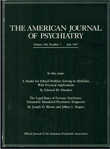Selective Alteration of Personality and Social Behavior by Serotonergic Intervention
Abstract
OBJECTIVE: The authors sought to test the causal hypothesis that serotonergic function modulates aspects of the normal spectrum of individual differences in affective experience and social behavior in humans. METHOD: A selective serotonin reuptake inhibitor (SSRI), paroxetine, 20 mg/day (N=26), or placebo (N=25) was administered to normal volunteers in a double-blind manner for 4 weeks, and personality variables and social behavior were assessed at baseline and at weeks 1 and 4 of treatment. RESULTS: Relative to placebo, SSRI administration reduced focal indices of hostility through a more general decrease in negative affect, yet did not alter indices of positive affect. In addition, SSRI administration increased a behavioral index of social affiliation. Changes in both negative affect and affiliative behavior were significantly related to volunteers' plasma SSRI levels at the end of the experiment. CONCLUSIONS: Central serotonergic function may modulate a dimension of normal personality characterized by reduced negative affective experience and increased affiliative behavior. SSRI administration has significant and detectable effects on these measures even in the absence of baseline clinical depression or other psychopathology.



